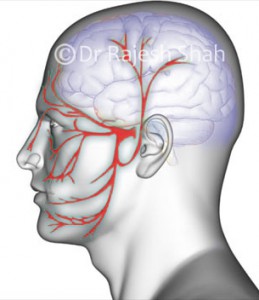Trigeminal Neuralgia is a difficult condition, not only for the sufferer but also for the people around them. Every attack catches the patient’s family members off guard as they watch the suffering helplessly. Here is a guide to help family members and friends care for somebody with trigeminal neuralgia.
Neuralgia is a difficult condition, not only for the sufferer but also for the people around them. Every attack catches the patient’s family members off guard as they watch the suffering helplessly. Here is a guide to help family members and friends care for somebody with trigeminal neuralgia.
Recognize the Onset of an Attack:
An attack of trigeminal neuralgia is commonly brought on by triggers like eating a hard substance, brushing, shaving, blowing one’s nose, applying makeup, drinking hot or cold drinks, or the cold draft of wind brushing against their face. Keep a watch for these common triggers. Over a period of time, you will be able to identify what are the usual triggers for your patient. If you know when to expect an attack, you will be better prepared to deal with the attack.
The following may be the first signs of a Trigeminal Neuralgia attack:
- Physical Jerk
- Sudden period of silence or immobility
- Involuntary twitching of facial muscles
- A shout of pain
Catch them when they fall:
There may be instances when your friend or family member may experience an attack in the middle of a conversation or in the middle of a meal. This may cause them to freeze up suddenly often to the surprise of other guests. Your loved one will definitely appreciate it if you can jump in to take over the conversation or explain the situation to the guests.
It’s not their Fault, it’s the Medicines:
Trigeminal Neuralgia treatment often needs high doses of anti- convulsion medications which may make the patient forgetful, confused and slower than before. This is because the medicines are often designed to suppress the impulses that are firing in the brain and may affect other brain functions like memory and thought processes. This may become obvious when patients forget important dates, repeat themselves or have trouble recalling words. This often becomes a source of embarrassment or irritation to the patient. They may seem more exhausted, nauseated, depressed or sleepy.
Learn about their Disease:
Try and read up as much as you can about Trigeminal Neuralgia. The patient will be gladdened by the interest you are taking in their disease. It will also help you understand what your friend or family member is going through. This knowledge will also help you explain the problem to others when the patient has a bad day.
Patience is a Virtue:
Like every disease, having a chronic disease like trigeminal neuralgia can cause irritability, frustration, anger or even sadness. Be sympathetic and patient at such times. Be aware that this disease does tend to have periods of relapses and remissions. Do not get disheartened if there is relapse after months of symptom free period. When their pain is severe, do not try to engage them in long conversations, as this may increase the pain even further. Eye contact or hand gestures will be important at such times.
Even if a grunt is all the response you get, be there for your family member through their trigeminal neuralgia pain, without taking over total control of their lives. Homoeopathic treatment for Trigeminal Neuralgia is an efficient and safe treatment modality. Homoeopathic medicines help reduce the frequency and intensity of trigeminal neuralgia attacks. The dependence on anti-convulsion medications is also greatly reduced.
To know how your family member’s trigeminal neuralgia can be controlled with Dr Rajesh Shah’s research based homoeopathic medicines at LifeForce, leave us your contact details below and we will get in touch with you.




